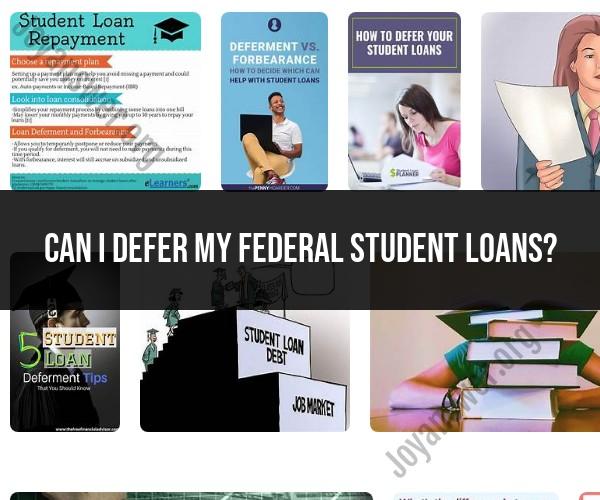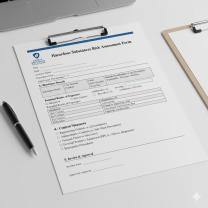Can I defer my federal student loans?
Yes, you can defer your federal student loans under certain circumstances if you meet the eligibility criteria. Federal student loan deferment is a temporary period during which you can postpone making payments on your loans without accruing interest or going into default. Here are some common situations in which you may be eligible for federal student loan deferment and the process to apply:
1. In-School Deferment:
- Eligibility: You are enrolled in an eligible degree program at least half-time at an accredited school.
- Process: Typically, your school will notify your loan servicer of your enrollment status, and the deferment will be automatically processed.
2. Economic Hardship Deferment:
- Eligibility: You are experiencing economic hardship, such as low income or unemployment.
- Process: You will need to request an economic hardship deferment from your loan servicer. You may be required to provide documentation of your financial situation, such as tax returns or proof of government assistance.
3. Unemployment Deferment:
- Eligibility: You are actively seeking but unable to find full-time employment or experiencing economic hardship.
- Process: Request this deferment from your loan servicer and provide documentation, such as unemployment benefit records or job search documentation.
4. Graduate Fellowship Deferment:
- Eligibility: You are enrolled in an eligible graduate fellowship program.
- Process: Provide documentation from your school or fellowship program to your loan servicer.
5. Peace Corps or AmeriCorps Deferment:
- Eligibility: You are serving in the Peace Corps or AmeriCorps.
- Process: Request deferment through your loan servicer and provide documentation from your service organization.
6. Military Service Deferment:
- Eligibility: You are on active duty military service, including the National Guard and Reserves, during a war, military operation, or national emergency.
- Process: Request this deferment from your loan servicer and provide documentation from your commanding officer or service branch.
7. Parent PLUS Borrower Deferment:
- Eligibility: Parents who have taken out Parent PLUS loans may be eligible for deferment while their dependent student is enrolled at least half-time in school.
- Process: Request this deferment from your loan servicer and provide documentation of your child's enrollment status.
It's essential to contact your loan servicer to discuss your specific situation and eligibility for deferment. They can guide you through the application process and provide the necessary forms and instructions. Keep in mind that interest may continue to accrue on some types of federal student loans during deferment, so it's important to understand the terms and consequences associated with your specific loan type.
Understanding Loan Deferment and When It's Applicable
Loan deferment is a temporary suspension of student loan payments. During deferment, interest does not accrue on subsidized federal student loans, but it does continue to accrue on unsubsidized loans and private student loans.
Loan deferment can be a helpful option for borrowers who are experiencing financial hardship or who are pursuing certain educational or career goals. However, it is important to note that deferment is not a forgiveness program. Borrowers will still be responsible for repaying their loans in full, plus interest, after the deferment period ends.
Eligibility and Conditions for Deferring Federal Student Loans
To be eligible for a deferment on federal student loans, borrowers must meet certain criteria. The specific eligibility requirements vary depending on the type of deferment, but some common criteria include:
- Being enrolled at least half-time in an eligible college or university
- Serving in the military
- Experiencing financial hardship
- Working in certain public service jobs
In addition to meeting the eligibility requirements, borrowers must also meet certain conditions to receive and maintain a deferment. For example, borrowers must be in good standing on their loans and must provide documentation to support their deferment request.
How to Request a Deferment for Your Federal Student Loans
To request a deferment for your federal student loans, you must contact your loan servicer. You can find your loan servicer's contact information on your student loan statement or on the Federal Student Aid website.
Once you have contacted your loan servicer, they will provide you with the necessary paperwork to complete your deferment request. You will need to provide documentation to support your request, such as a letter from your employer or school verifying your enrollment or employment status.
Navigating the Deferment Process Successfully
To navigate the deferment process successfully, it is important to be proactive and to communicate regularly with your loan servicer. Once you have submitted your deferment request, be sure to follow up with your loan servicer to ensure that they have received it and that it is being processed.
If you have any questions or concerns about the deferment process, be sure to contact your loan servicer. They can help you understand the requirements and conditions for deferment, and they can assist you with completing the necessary paperwork.
Alternatives to Deferment: Forbearance and Other Options
If you are not eligible for deferment, or if you need more flexibility with your student loan payments, you may want to consider forbearance. Forbearance is another type of temporary relief from student loan payments. However, unlike deferment, interest does accrue on all types of student loans during forbearance.
In addition to deferment and forbearance, there are a number of other options available to borrowers who are struggling to make their student loan payments. These options include:
- Income-driven repayment plans: Income-driven repayment plans cap monthly payments at a certain percentage of the borrower's discretionary income. This can make student loan payments more affordable for borrowers who are struggling financially.
- Public Service Loan Forgiveness: The Public Service Loan Forgiveness program forgives the remaining balance on federal student loans for borrowers who work full-time in certain public service jobs for 10 years.
- Student loan forgiveness programs for teachers: There are a number of student loan forgiveness programs available to teachers who meet certain criteria.
If you are struggling to make your student loan payments, be sure to explore all of your options. There may be a program available to help you make your payments more affordable or to forgive some or all of your loan debt.












